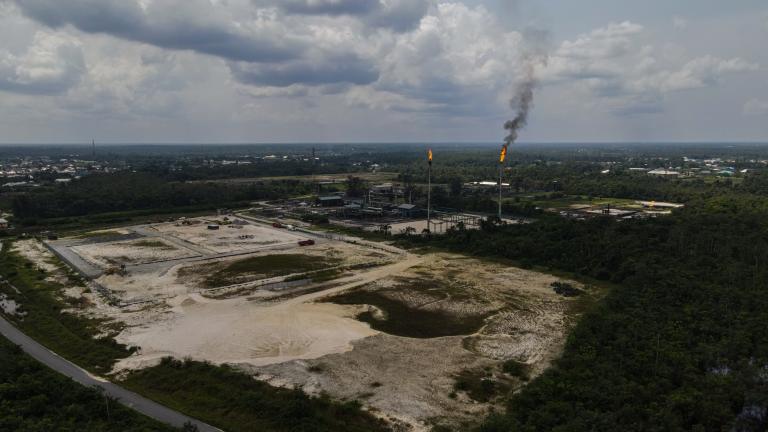By Phoebe Holmes /Africa as a Country/ – The decision of a Dutch court in January 2021 to order Shell’s Nigerian subsidiary to compensate local farmers over recurring oil leaks has been welcomed by many, invoking “tears of joy” in some cases. Although the outcome of this hearing is certainly better than its immediate alternative, celebration is premature. The strength of the case largely lies in its potential to kick-start a cumulative prosecution wave that may eventually mean oil conglomerates are meaningfully held to account.
Putting pressure on governments and international bodies to economically sanction harmful activity in the Niger Delta has proven to be insubstantial in the past. Under neoliberal capitalism, harmful activity is legitimized and reproduced through these practices—if community remuneration is to become commonplace in the oil sector, such expenses will merely become a cost-of-business in an organizational balance sheet. Implicit in the existence of such regulation is acceptance of the transactions that occur, reinforcing the ideology that environmental and social wellbeing has a price tag. A reconceptualization of crime to encompass the actions of an elite class, and a dismantling of neoliberal ideals is required to open up the possibility of significant change in the region.
The intricate ecosystem of the Niger Delta is home to countless species of flora and fauna, and is fundamental to the culture, identity and livelihoods of the local Ogoni people. Their way of life has been agonizing over the decades with many communities displaced from ancestral territories, left to survive on land and waters degraded beyond rejuvenation and surrounded by conflict and unrest. Repeated spills have been the source of years of tension between transnational corporations and local communities, a struggle marked by extreme power asymmetries and inexorable ideological incompatibilities.
Today, corporate and institutional actors hold distinguished yet interconnected roles, which ultimately complement one another to uphold an international economic order in which crime is embedded. In post-independence Nigeria, unequal power relations and a subordination of the poor majority’s needs to that of capital accumulation were enhanced through globalization and neoliberalism, aiding corrupt practices and shaping the neocolonial climate. Internationally, we see that capitalism in its most unsparing form has laid fertile ground for the proliferation of economic crime. However, it must also be understood that to see the dominant economic system per se as the problem is a simplification—we must delve further into the roles of the particular powerful actors that represent, enforce, and drive the reproduction of neoliberal capitalism.
In considering the above, the corporate actor is perhaps the most obviously befitting—many engaging extensively in lobbying, insulating themselves by having input into regulatory frameworks or working to remove regulation altogether (a painless task in today’s intensely pro-market climate). In Nigeria, oil syndicates consistently act outside the law, employing aggressive attempts to block protective legislation for communities. Exact figures of oil spills in the region vary, but it can be safely understood that recent decades have seen millions of barrels of oil illegally leaked into the natural systems of the Niger Delta. Shell Petroleum’s own records depict an annual company average of 221 spills in its area of operation since 1989—of course, the true figure is likely to be far higher.
Read the full story on Africa as a Country






